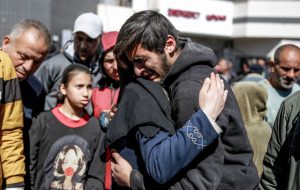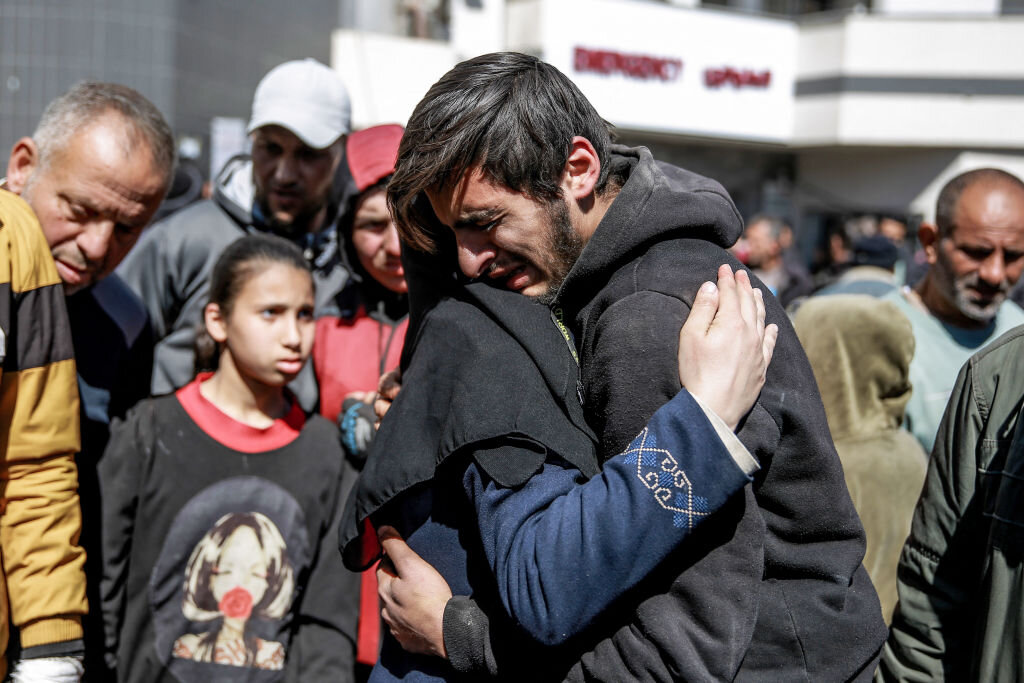The ICC warrants over Gaza are a warning for the U.S., too
As of Thursday, Israeli Prime Minister Benjamin Netanyahu is officially wanted for war crimes and crimes against humanity — a stunning position for the leader of one of the nations closest to the U.S., which positions itself as a champion of international humanitarian law to protect against such crimes. The International Criminal Court (ICC) has unveiled arrest warrants for


As of Thursday, Israeli Prime Minister Benjamin Netanyahu is officially wanted for war crimes and crimes against humanity — a stunning position for the leader of one of the nations closest to the U.S., which positions itself as a champion of international humanitarian law to protect against such crimes.
The International Criminal Court (ICC) has unveiled arrest warrants for Netanyahu and his former defense minister Yoav Gallant for alleged crimes during Israel’s ongoing offensive in the Gaza Strip, charging the two men with enforcing starvation and killing innocent people during “a widespread and systematic attack against the civilian population of Gaza.”
On Thursday, the court also issued a warrant for alleged crimes against humanity and war crimes for Mohammed Deif, a commander of Hamas, the Gaza-based Palestinian militant group. (Israel claims to have killed Deif, but Hamas has not confirmed his death as it has for its other leaders.)
A White House spokesperson condemned the ICC for targeting the Israelis — without commenting on the court’s decision regarding Deif, whom the Biden administration placed under sanctions in September. Accusing the court of “troubling process errors” and overstepping its jurisdiction, the spokesperson said the administration is preparing “next steps.” Israel also rejected the charges and blasted the ICC.
But Thursday’s move made clear that regardless of Washington’s actions, the global conversation around the Gaza war is headed in a direction that will increase pressure on the U.S. and Israel, which heavily relies on American diplomatic and military support.
President Joe Biden has so far declined to reduce U.S. backing for Israel even as international observers, U.S. lawmakers and watchdog groups have said its conduct violates American and international law. Neither has President-elect Donald Trump suggested he would withhold assistance to Israel once he takes office in January.
Legal experts told HuffPost the warrants will boost international scrutiny of Israeli actions enabled by the U.S. and whether the two countries have fulfilled their promises to respect global standards for shielding civilians during wartime.
While Israel is extremely unlikely to surrender Netanyahu and Gallant, meaning there’s a slim chance they’ll face trials, “the arrest warrants will not go away,” said Adil Haque, a Rutgers University professor.
“Every ICC member has to arrest [the Israelis] if they visit, and at a political level this will compromise their ability to have public contacts with them,” he continued.
The U.S. and Israel are not members of the ICC, but 124 of the world’s countries — the majority — are. After the warrants were issued, officials in several European countries and Canada said they would respect the ICC order, suggesting they would arrest Netanyahu and Gallant (though some ICC member countries have previously failed to execute ICC warrants). The deputy prime minister of Belgium, Petra de Sutter, argued the continent’s reaction could extend to challenging the European Union’s association agreement with Israel, which involves a lucrative free trade deal.
The warrants could “stiffen the spine of national authorities in other countries to pursue their own prosecutions related to Gaza,” said Brian Finucane, a senior adviser at the International Crisis Group think tank.
Citing the principle of “universal jurisdiction,” under which governments can pursue suspects for major international crimes regardless of their nationality or where the incidents occurred, Finucane said: “Israeli officials will face possible criminal exposure in third states for years to come.”
Such prosecutions could include legal action against “those aiding and abetting actions in Gaza,” he continued — a circle that could include American officials who have overseen weapons transfers to Israel while knowing about its pattern of alleged war crimes.
“Warrants are one more reminder to U.S. officials that they have been aiding and abetting men credibly accused of war crimes and crimes against humanity.”
“Warrants are one more reminder to U.S. officials that they have been aiding and abetting men credibly accused of war crimes and crimes against humanity,” said Finucane, who previously worked as a lawyer at the State Department.
The ICC’s Thursday statement highlighted ties between American leverage and Israeli policy choices, implicitly suggesting the U.S. could have done more to prevent civilian harm.
Israel’s decisions on humanitarian aid for Gaza “were often conditional,” the statement reads. “They were not made to [fulfill] Israel’s obligations under international humanitarian law… In fact, they were a response to the pressure of the international community or requests by the United States of America. In any event, the increases in humanitarian assistance were not sufficient to improve the population’s access to essential goods.”
Meanwhile, the ICC development shows the weakness of the argument that Israel’s domestic legal system can handle claims of atrocities or violations of international law.
Israel’s government has previously told the ICC its “robust” judiciary can “rigorously” probe misconduct.
That assertion evidently “did not really convince” the court’s judges as they weighed the ICC prosecutor’s request for warrants for Netanyahu and Gallant, Suzie Navot, an Israeli constitutional law professor, wrote on X. She noted that the Israeli government has not set up a state commission of inquiry into the Gaza war — which would have far-reaching investigative powers — despite the Israeli attorney general’s advice to do so.
Whether Israel pursues internal accountability for possible war crimes is a major factor in the question of whether it can legally receive support from countries like the U.S., which prohibits aid to nations engaging in major human rights abuses, and whether Israel should face consequences like international sanctions for its conduct.
Thursday’s announcement that ICC judges see “reasonable grounds” to believe Netanyahu and Gallant “bear criminal responsibility” for “ongoing” crimes, including enforcing mass starvation among Palestinians and intentionally killing civilians, comes amid other international evaluations of Israeli conduct.
The International Court of Justice (ICJ) is still considering South Africa’s case accusing Israel of perpetrating a genocide in Gaza. Its proceedings are expected to continue for years to come, ensuring continued high-profile discussions of Israeli decisions blessed by the U.S.
Officials and experts working on distinct global legal proceedings often lean on each other’s conclusions and analyses as they reach their own judgments.
Haque noted that the ICC judges suggested Israeli leaders had “created conditions of life calculated to bring about the destruction of part of the civilian population in Gaza,” which is in line with the definition of genocide — “though genocide requires a different mental state of specific intent.”
And the parties to the Geneva Conventions — which govern much of international law — plan to hold a conference on the Middle East in March. The confab could weigh in on whether Israel is occupying Gaza under international law, which would mean the Israeli government bears special responsibility in caring for its population. The ICJ said in July that Israel is occupying the Palestinian region.
“I assume the vast majority of the Conference will agree,” Haque told HuffPost, saying “a strong conference statement would still be useful.”
For the U.S., mounting and ongoing inquiries into the Gaza war will likely fuel strategic complexities for years. Those could include charges that America is selective in its commitment to international law — given its ardent opposition to the ICC’s first-ever warrants for figures allied with the West — as well as tensions in important foreign relationships and embarrassing findings about U.S. culpability in horrifying aspects of the Gaza war.
Condemnations or revelations from abroad could strengthen domestic frustrations against overwhelming U.S. support for Israel, which has become a major issue in national politics.
Developments in the ICJ case, further warrants over the U.S.-backed Israeli offensive in Gaza or other events could inspire new public anger and fresh battles in Congress that build on already unprecedented votes challenging the U.S.-Israeli relationship.
In 2023, Biden cheered the court’s issuance of a warrant for Russian President Vladimir Putin over war crimes during his full-scale invasion of Ukraine. The Biden administration then decided to support the ICC in its investigation of Russian activity.
Now, Haque said, “the U.S. is in an untenable position, supporting the warrant for Putin but opposing the warrant for Netanyahu.”
“But perhaps Trump will oppose both,” he added. The incoming president has expressed admiration for Putin and accused Biden’s team of unwisely provoking him.
Differing approaches to the court could drive a split between the U.S. and Europe — traditional friends already likely to be at odds under a second Trump presidency over matters like trade, Ukraine and climate policy.
“The EU should prepare for a U.S. attack on the ICC,” Anthony Dworkin, a senior policy fellow at the European Council on Foreign Relations think tank, argued in a Thursday post. Europe must “resist any US pressure to cut its own ties and support for the court.”
(Source: Huffington Post)
